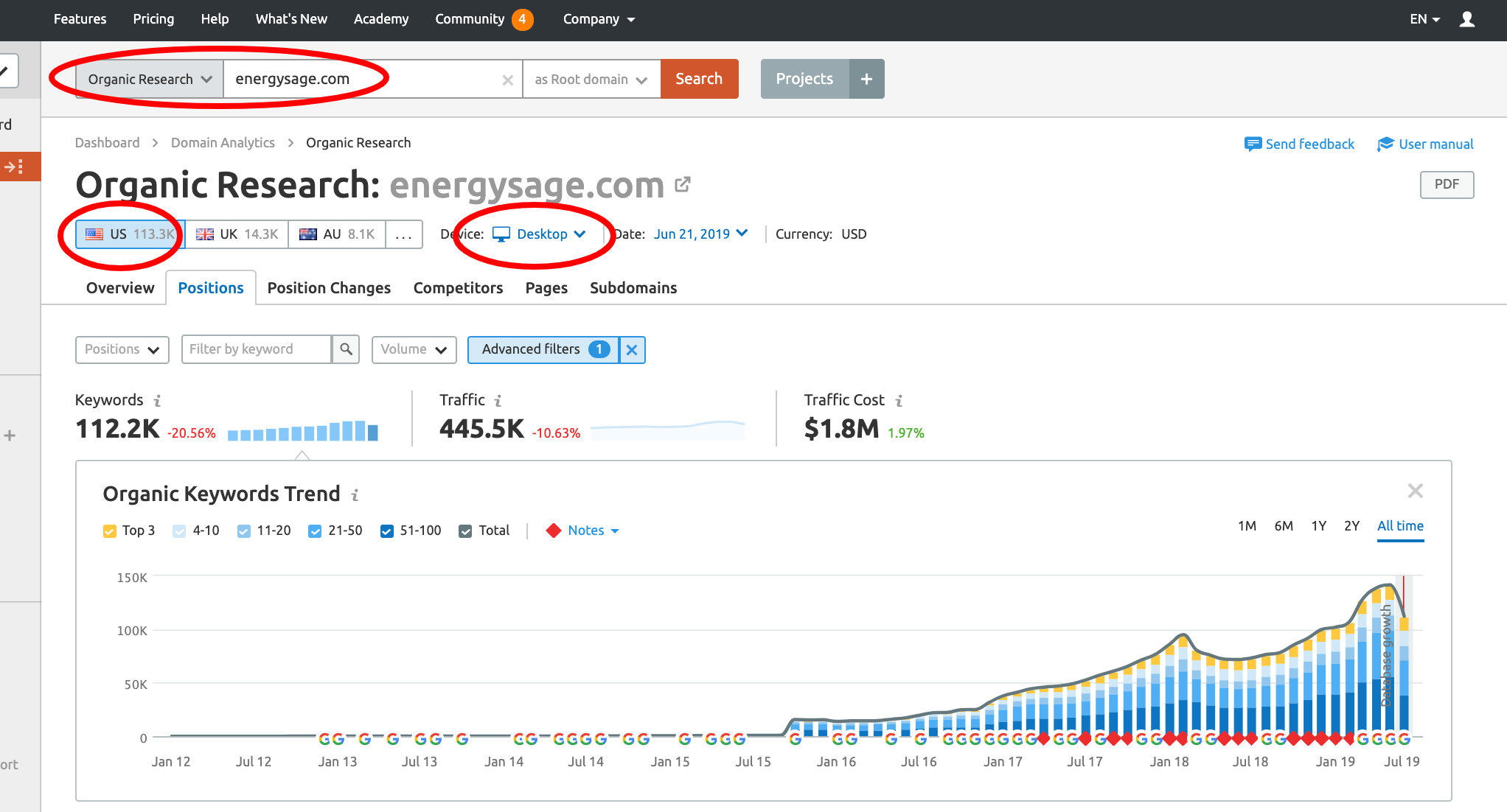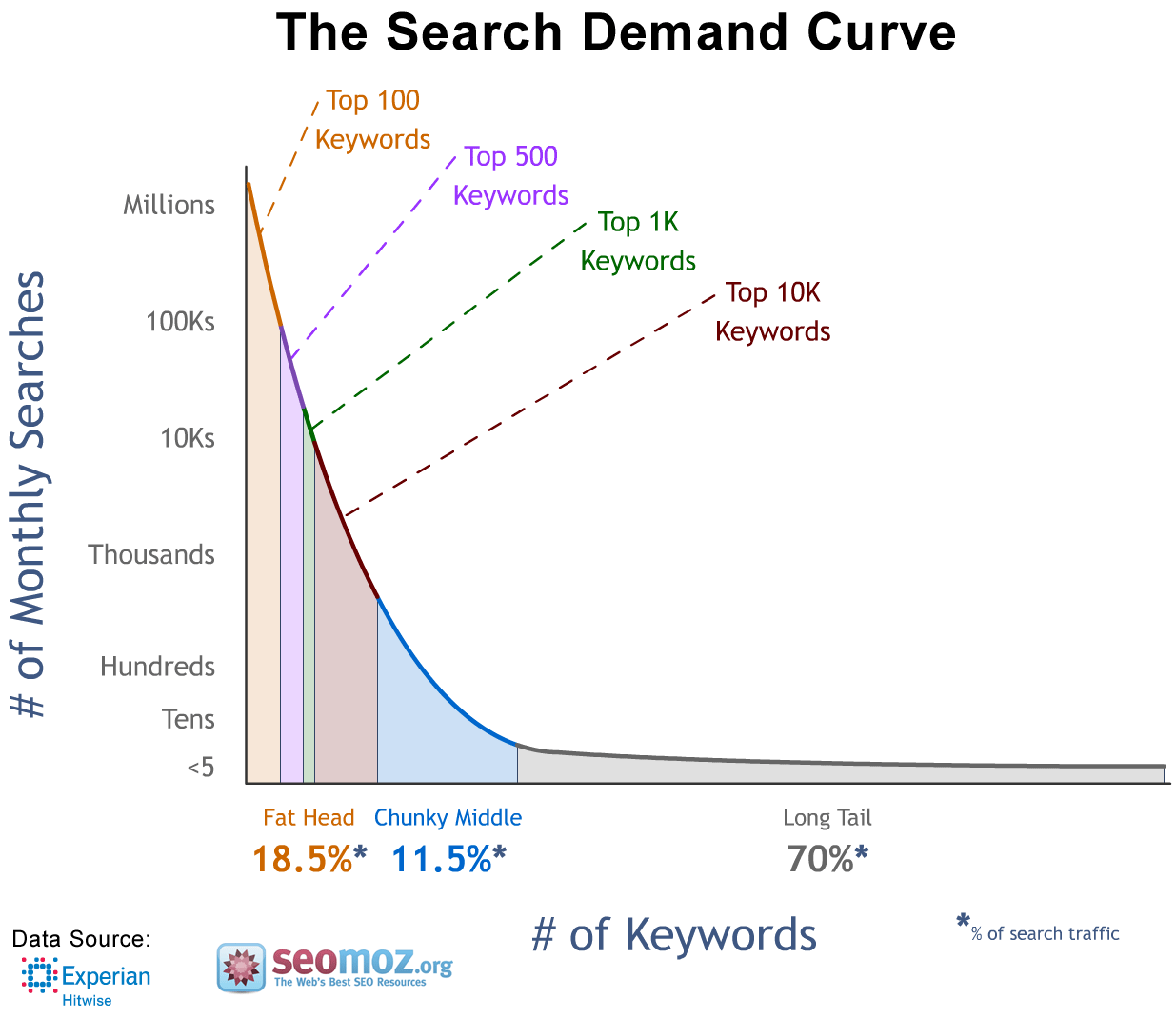If you’re still unsure about the value that search engine optimization (SEO) can bring to your business, it’s worth looking at EnergySage. Based on an analysis by SEMRush, the desktop version of EnergySage’s website is getting half a million monthly visits in the continental U.S alone.
Note that this is organic traffic, which means EnergySage would need to spend $1.8 million on Google Ads for the same amount of traffic.
If you want to increase your success on Google, choosing the right SEO consultant or expert is an imperative first step.
This guide details the necessary knowledge needed to make the right hire, while also providing insights to how potential candidates should be interviewed. Following these recommended guidelines will help ease the process of narrowing down a field of consultants.
SEO Is NOT Just About the Main Keywords
SEO means Search Engine Optimization, which, as the name suggests, is the process of increasing your website’s visibility in organic search results. It’s very common for solar businesses to say, “I just want to rank #1 for [ontario solar installation]” or whatever geolocation they’re at. Of course, if you make use of the “solar company + [City Name]” keyword format, it WILL generate tons of leads for you.
However, it’s important to realize that “solar company + [City name]” is not the only thing potential clients are searching for.
Some common Google search questions/phrases include the following:
1. How much does a solar installation cost in [City Name]?
2. Solar rebate programs in [State/Province Name]
3. Solar initiatives in [State/Province Name]
4. Is it economical to have rooftop solar in [City Name]?
5. Financing options for solar projects in [State/Province Name]
In the world of SEO, these kinds of questions are called “long-tail keywords”. These primarily differ from “main keywords,” in which “solar company + [City name]” is an example. In most cases, “long-tail keywords” represent a missed opportunity for solar companies.
To gain a deeper understanding of “long-tail keywords,” it is imperative to analyze the content marketing side of SEO as well.
Why SEO and Content Marketing Are “Better Together”? (Especially for Solar Companies)
First, it’s important to understand what content marketing is. My favorite definition of this term is written by CMI:
Content marketing is a strategic marketing approach focused on 1) creating and distributing valuable, relevant, and educational content consistently, 2) to attract and retain a clearly defined audience and 3) ultimately, to drive profitable customer action.
Content marketing can be done through various mediums, including videos, images, infographics, podcasts, and of course, blog posts. Compared to traditional advertising, content marketing focusses on building long-term trust with consumers, rather than making a quick sale. Thinking in this manner often requires a shift in mindset, since the goal of your articles aren’t to persuasively sell your product/service. Instead, the goal is to help your readers make informed decisions by providing them with easy to understand, educational, and balanced information.
So, what kind of “mindset shift” are we talking about here? The shift requires the recognition that the advertisement isn’t about you — it’s about making your customer’s life easier. To achieve that, you need to know the problems and challenges customers are facing when it comes to solar energy.
When building your solar buyer persona, you’ll likely generate a long list of questions that potential customers need answers to. Each of the developed questions would make for great topics to write about.
The truth is that ranking well on Google’s search results for these questions is actually easier than ranking well for main keywords.
By enabling your blog posts to rank well for commonly asked questions relating to your company, you will:
1. Be perceived by your potential solar customers as a “thought leader,” helping to gain their trust and making future sales easier;
2. Potentially convert them into your Email subscribers;
3. Have a chance to re-target to them with Google remarketing and Facebook remarketing ads;
How much does SEO cost?
Before you hire a consultant to take on this critical role, knowing your company’s needs is a must. SEO success used to require only technical knowledge (on-site and off-site SEO).
However, supplementary knowledge of the cores of content marketing: building buyer personas, mapping the buyer’s journey, editorial experience, are also very important. There are essentially three ways to bring in SEO talent to your company: hiring in-house, outsourcing (remotely or locally), or hiring an SEO trainer.
Hiring in-house: annual salary of 42K~85K
If your company is big enough to hire a full-time SEO, then the following information will help clarify the associated costs. The national average annual salary for hiring an in-house SEO is CAD $46,000 and USD $42,862 in Canada and the U.S, respectively.
However, if you’re looking to hire someone who is skilled at both SEO and content marketing at the industry level, with 5+ years of experience, you need to be prepared to pay $65K-85K annually. Websites such as Indeed allow you to compare how much other companies are willing to pay for the same profession/skill level.
Outsourcing to a local agency: $1500-5000 monthly fee
As an alternative to staffing an in-house SEO, your company may choose to hire a local digital agency. The most important thing when outsourcing SEO is to look for an SEO-focused agency. An important note: DO NOT trust any so-called “full-service agencies.” If you’re looking for 10X growth, you need a subject matter expert like the team at pvbuzz.com!
SEO experts usually charge a monthly retainer of $1500-5000 depending on the scope of work, with 6-12 months commitment.
Outsourcing to a remote team: $500-1500 monthly fee
Your company may also decide to outsource SEO to a remote team. The greatest advantage in hiring companies that provide this service (such as UpWork or Fiverr) is the incredibly low price. Unfortunately, experiences with overseas SEO teams tend to be fairly hit or miss. It’s quite easy to find success stories, as well as horror stories. If you choose to go this route, then proceed with caution.
SEO trainer: a one-time fee of $5000-20,000
This is actually the most cost-effective option out of those listed today. SEO trainers typically teach your internal marketing team; keyword research, technical SEO, backlink building and much more. Importantly, they also provide written “SEO guidelines” for your team to follow when training is over. SEO trainers usually charge a one-time fee of $5000-$20,000, depending on what skills are included.
Here’s what I can say: a great SEO trainer will never charge low prices because they know how much potential they can offer your company. If you’re hunting for a discount, chances are you’ll end up with an SEO trainer who cuts corners and hurts your website in the long run. The key to SEO success is to have the right SEO talent, and the key to finding the right SEO talent is to ask the right interview questions.
How to interview SEOs for your solar company?
Choosing the right SEO is a prerequisite for a successful SEO campaign. It’s the most important variable when it comes to maximizing your return from SEO. Unfortunately, this is usually where things go wrong.
Avoid “full-service” agencies
I’ve already mentioned the importance of hiring an SEO focused agency instead of a “full-service” agency. This point cannot be understated. There’s a saying in our digital agency industry: “Full-service agencies are full of crap.” Honestly, I couldn’t agree more.
As a result of the fast-changing nature of digital marketing, no one can be an expert at everything. These so-called “full-service agencies” will tell you they can do everything: web design, branding, PR, social media marketing, PPC and Email marketing. In reality, they hardly ever deliver the intended results. Typically, these agencies are good at one or two things if you’re lucky. At the end of the day, their “service” quality is reflected by the non-results.
Google teaches you how to hire an SEO
Thankfully, Google has put together an official video about how to hire competent SEOs. The video also details and dispels common myths about SEO.
Interview question to ask SEO candidates
Throughout the interview process, it’s important to ask a lot of questions. You can find some example questions to use below. Comparing the SEO candidate’s answers to this article will give you a gage of their expertise.
1. Why is SEO and content marketing “better together?”
Give me an example where you helped a website rank within the top 3 for their main keywords.
2. Give me an example where you helped improve the rank of a blog post to Featured Snippet (ie. Position Zero).
3. What are the differences between writing copies for service/product pages and writing a blog post?
4. Can you tell me how you would build buyer personas?
5. Can you tell me how you would map the buyer’s journey?
6. If I tell you our buyer personas, can you guess what my potential customers are likely to google?
If you’re unsure about some of the answers to these questions, by all means, contact us and we’ll walk you through the process. It’s important you know the information before you conduct interviews so that you can find the SEO candidate best suited to your company.
What Are the Key Takeaways From This Article?
1. SEO is NOT just about the main keywords. In most cases, “long-tail keywords” are the gold mine that solar companies miss out on.
2. It takes less time to get your articles featured on the first page of Google for long-tail keywords than for main keywords.
3. There are three ways to bring in SEO talent to your company: a) hiring in-house, b) outsourcing and c) SEO trainer. You need to consider budget, manpower, and talent to decide how to bring in SEO.
4. Choosing the right SEO candidate is the single most important thing if you want to maximize your return on SEO.
5. Full-service agencies are full of crap. Therefore, you should avoid them indefinitely.
6. Google developed an official video about how to hire competent SEOs. You need to watch it.
—
This article was written for pvbuzz.com by Willie Jiang, and Edited by Derick Lila.
 Willie Jiang believes that content marketing can push the energy revolution along at a faster pace. As an SEO expert, he has helped countless brands grow their organic traffic by 10X and now he is sharing his insights with the renewable energy industry.
Willie Jiang believes that content marketing can push the energy revolution along at a faster pace. As an SEO expert, he has helped countless brands grow their organic traffic by 10X and now he is sharing his insights with the renewable energy industry.











Comments